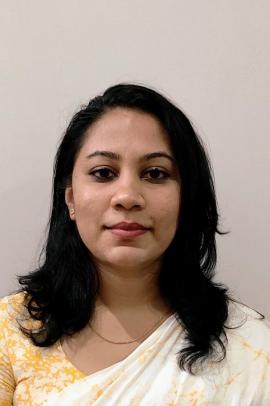By dev-interdisci…
on Thu, 07/09/2020 - 12:31
Course Modules
IS1103 English Language Skills Enhancement I
IS1203 English Language Skills Enhancement II
IS2401 Communication Skills and Technical Writing
IS2302 Communication Skills
Feilds of Spcializations
English Language Teaching
Research Publications
Journal Articles
- Premarathne.K. (2011). A Comparative Study on ESL Learning Styles and Teaching styles. Journal of the Faculty of Humanities and Social Sciences, 16, p. 55-73.
- Premarathne.K. and Gamage, S. (2013). Everything in the Universe Has a Rhythm So as Learning and Teaching. Journal of the Faculty of Graduate Studies.2, p. 34- 41.
- Premarathne.K. (2018). Exploring the Reasons for the Fossilization of Phonological Errors: A case study of the substitution of /o/ for / ɔ / by English as Second Language Learners in Sri Lanka, Advances in Language and Literary /studies, 9 (4).
- Premarathene, K. (2018b). The Effect of Explicit Corrective Feedback on Phonological Intelligibility, IOSR Journal Of Humanities And Social Science (IOSR-JHSS), 23(9),11-19. Link: http://www.iosrjournals.org/iosr-jhss/papers/Vol.%2023%20Issue9/Version-6/B2309061119.pdf
- Premarathne,K.,and Premaratna,C.D.H.M., (2021).The Pedagogical Effect of Teacher and Student- Centered Corrective Feedback Moves on Pronunciation Intelligibility. International Journal of Scientific and Research Publications (IJSRP), 11(2) (ISSN: 2250-3153), DOI: http://dx.doi.org/10.29322/IJSRP.11.02.2021.p11086
- Nagodavithana, S., & Premarathne, K., (2021). A Study of Vocabulary Learning Strategies and their Effect on Vocabulary Development. Journal of English Language Teaching and Applied Linguistics, 3(2), 68-77. DOI: https://doi.org/10.32996/jeltal.2021.3.2.7
- S.Nagodavithana and P.B.T.K Premarathne (2022). Learner Perspectives of Synchronous and Asynchronous Online Education: A Comparative Study. International Journal of Scientific and Research Publications (IJSRP) 12(7) (ISSN: 2250-3153), DOI: http://dx.doi.org/10.29322/IJSRP.12.07.2022.p12717
- Nagodavithana, S., Premarathne, PBTK. (2023). Factors Leading to Reticence in Speaking in English amongst English as a Second Language Learners in Sri Lanka at Tertiary Level. Indiana Journal of Arts & Literature, 4(10),1–7 https://doi.org/10.5281/zenodo.10058836
- Premarathne, P.B.T.K. and Nagodavithana,S. (2024). Developing Oral Fluency of Second Language Learners: A Narrative Review. ISRG Journal of Arts Humanities & Social Sciences (ISRGJAHSS), II(IV), 355–363. https://doi.org/10.5281/zenodo.13334792
- Premarathne, P.B.T.K. (2024). Students’ perspectives of English within university subculture in Sri Lanka: Resentment or acceptance? International Journal of Innovative Research and Multidisciplinary Education, 3(12), 1858-1865. https://doi.org/10.58806/ijirme.2024.v3i12n03
- Premarathne, P. B. T. K., & Maheshika, H. G. P. (2026). Non-verbal communication in academic presentations: Evidence from engineering technology undergraduates. International Journal of Educational Innovations, 2(2), 64–73. https://doi.org/10.46451/ijei.260117
Abstracts
- Premarathne, K. (2011). Transformation in Teaching: A Comparative Analysis of Online and Face to Face Teaching. A Paper presented at the 12th Annual Research Symposium of the University of Kelaniya. Kelaniya.
- Premarathne, K. (2012). Teaching Reading Comprehension to ESL Learners. A paper presented at the first national symposium of the Buddhist and Pali University of Sri Lanka.
- Premarathne, K. (2012). Laughter the Best Medicine: Is Humour an Effective Tool in ESL Classroom ?. A paper presented at the 07th SLELTA conference. Sri Lanka Foundation Institute.
- Premarathne, K .(2012).Learners’ and instructors ‘perceived beliefs on language anxiety in ESL classroom. A paper presented at Pandit G. P. Wickramarachchi Memorial Research Symposium. BMICH, Sri Lanka.
- Premarathne, K. (2013).Positive Learning Environment. Does it bring better learning outcomes? [Abstract], A paper presented at the 6th Royal Asiatic Society of Sri Lanka.
- Premarathne, K. (2016). Learning Styles of NDT Students. A paper presented at the fourth annual research symposium of the Institute of Technology University of Moratuwa.
- Premarathne, K. (2016). Integrating Generic Skills into NDT curriculum. A paper presented at the fifth annual of the Institute of Technology University of Moratuwa.
- Premarathne, K. (2017). A study on incorporating gamification into ESL classroom via Kahoot! A paper presented at the 3rd International Conference on the Humanities, University of Kelaniya.
- Nagodavithana, S., & Premarathne, K., (2019). Advantages of Using Literary Texts in the English as a Second Language Classroom. A paper presented at the 6th Annual Research Symposium of the Institute of Technology, University of Moratuwa.
Qualifications
B.A (Hons.) (Kelaniya)
M.A in Linguistics(Kelaniya)
Ph.D. (Linguistics)

